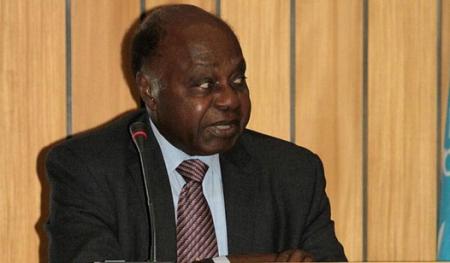He's the 84-year-old judge from the far side of the world who just stared down China.
Thomas Mensah hails from the West African nation of Ghana, a long, long way from the warships and artificial islands now crowding the disputed waters of the South China Sea.
But Dr Mensah has devoted his career to dissecting the byzantine labyrinth of laws that countries have agreed to govern the vast oceans covering two-thirds of the world - what behaviour is allowed, and what's not.
And having the gumption to tell one of the world's rising giants they are out of line is no small feat.
"He's very highly regarded," Paul Reichler, a partner at Foley Hoag LLP and a lawyer that led the Philippines' challenge to China, tells Fairfax Media.
"We were very pleased when Judge Mensah was appointed because we know he is an expert of the law of the sea, one of the pre-eminent experts in the world. He's a man of impeccable honesty, integrity and impartiality."
Dr Mensah was made president of a five-man tribunal to decide the Philippines case against China in the Permanent Court of Arbitration.
Though it is known as a court, this case was an arbitration of a dispute, with judges appointed to rule on the arguments.
The other judges came from France, Poland, the Netherlands and Germany.
Not that China will care, having refused to participate and deploring the ruling as "null and void" and with no binding force.
The tribunal's unanimous decision, delivered on Tuesday in the Hague, is nonetheless regarded as landmark.
It has ruled Beijing's dredging of sand and rocks to build artificial islands for airstrips and military bases in the South China Sea is a breach of environmental obligations.
Most significantly, it has rejected China's claims to historical rights to the territory under the vague but sweeping "nine-dash line" that covers the region.
Mr Reichler said it was a great victory for the Philippines.
"The prestige and independence, and expertise, of the arbitrators is very important for the credibility of the award internationally," he said.
"Of course the goal is to win the case, but we felt simply winning the case would not be enough. We had to have an award that would be well received, well regarded and well respected by the international community. That depends in large part on who the arbitrators are."
Dr Mensah studied first in Ghana, then the University of London and later at Yale Law School in the United States.
He has worked over decades in various roles on maritime law, publishing articles and serving as a judge.
He is no stranger to the delicacies of diplomacy, having also served as Ghana's first High Commissioner to South Africa in the 1990s.
He was then made the first president of the International Tribunal for the Law of the Sea.
To read the full piece from , click here.

